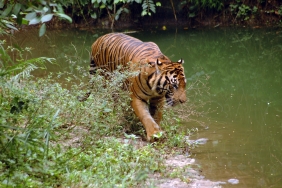INDONESIA TO HOST PRE-TIGER SUMMIT MEETING
Joint Press Release of the Ministry of Forestry
Jakarta, Indonesia - On July 12-14, 2010, in Nusa Dua, Bali, the Ministry of Forestry in collaboration with the Global Tiger Initiative-World Bank will host an important world meeting, the "Pre-Tiger Summit Partners Dialogue Meeting" which will be attended by delegates from 13 (thirteen) Tiger Range Countries (TRCs) namely Bangladesh, Bhutan, China, India, Indonesia, Cambodia, Laos, Malaysia, Myanmar, Nepal, Russia, Thailand, and Vietnam.
The meeting will also be attended by experts, international organizations such as CITES and IUCN, national/international NGOs (WCS, WWF, FFI, ZSL, RARE, IFAW, PKHS, LIF), HarimauKita Forum, mass media, donor agencies (USAID, AUSAID, GEF, BMZ-Germany, DFID, USAID, UK, Korea, Netherlands, New Zealand, Canada, Finland, France, Denmark, Norway, Russia, Slovenia, Spain, GEF, ADB, US Fish & Wildlife, Panthera, Smithsonian Conservation Biology Institute, etc).
This meeting in Bali is a preparatory meeting before the International Conference on Tiger Conservation at the head of state level "World Tiger Summit" in Saint-Peterburg Russia on September 15-18, 2010. According to Ir. Darori, MM. Director General of PHKA - Ministry of Forestry, in the meeting that will be held in Nusa Dua - Bali, it is expected that the delegates will jointly formulate the text of the Global Tiger Recovery Plan as an agreement between countries for tiger conservation and the concept of 'Leaders Declaration' which will be discussed at the head of state meeting in Russia. At the national level, the Government of Indonesia, led by the Ministry of Forestry and supported by relevant partners and institutions, has also formulated a similar text at the national level (National Tiger Recovery Program).
"We hope that this meeting can produce a manuscript of the World Tiger Recovery Program as a joint effort to find solutions to the threats faced by tigers in the world, including Sumatran tigers, and double their population in nature by 2022," said Dr. Ir. Harry Santoso Director of Biodiversity Conservation - Ministry of Forestry. Furthermore, the meeting is also expected to map out commitments and financial support from various parties for efforts to conserve these charismatic animals. In the context of preparations for the Heads of State Meeting, the Sumatran tiger is expected to increase its population in the wild by 2022.
In the context of preparations for the Heads of State meeting in Russia, the Bali meeting was a follow-up to the previous inter-state meetings held in Kathmandu, Nepal and Hua-Hin, Thailand. The meeting held in Kathmandu, Nepal in October 2009 resulted in an agreement to double the world's tiger population by 2022, while the ministerial meeting for tiger conservation in Hua-Hin, Thailand has produced a Declaration to support the conservation of the world's tigers. Currently, tigers are at an all-time high in the world.
Tigers are currently in critical condition. There are currently only about 3200 individuals left of the tiger species worldwide, which includes six sub-species: the Sumatran, Bengal, Amur, Indochinese, South Chinese, and Malayan tigers. The main threats to extinction include uncontrolled habitat loss and fragmentation, reduction in the number of natural prey, poaching and illegal trade, and conflicts with communities living around tiger habitats. The sub-species exist worldwide, and the tiger's habitat is currently only 32 individuals.
Indonesia's sub-species, the Sumatran tiger, with a population of approximately 400 individuals, represents 12 percent of the world's total tiger population - this has positioned Indonesia as a key country in tiger conservation in the world.
"Ironically, Sumatran tiger habitat has shrunk by almost 50% in the last 25 years. About 70% of the remaining habitat is outside conservation areas, spread over at least 20 isolated forest patches. This raises concerns that most of the remaining Sumatran tiger population is not under adequate protection. Therefore, it is important for Indonesian citizens to immediately close ranks and take concrete and appropriate conservation steps, so that the Sumatran tiger does not suffer the same fate as its two extinct brothers, namely the Javanese and Balinese tigers," said Hariyo T. Wibisono, Chairman of the HarimauKita Forum.
"Saving the remaining habitat, restoring critical areas, and implementing spatial planning that supports sustainable development - to provide sufficient home range for Sumatran tigers and minimize the possibility of conflict with humans, needs to be a common agenda in saving these protected animals," said Dr. Efransjah, CEO of WWF-Indonesia. Furthermore, according to him, saving forests, sustainable spatial planning and restoring critical areas of Sumatran tiger habitat are also very much in line with the Indonesian Government's commitment to the world in an effort to reduce carbon emissions from deforestation and forest degradation.
For more information:
Dr. Ir. Harry Santoso
Director of Biodiversity Conservation - Ministry of Forestry
Phone 021-5720227
WWF-Indonesia: Nazir Foead +62 811977604
Forum Harimau Kita : Hariyo T. Wibisono +62 8121099557





